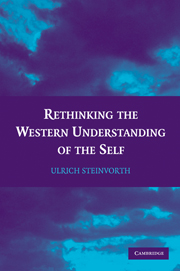Book contents
- Frontmatter
- Contents
- Preface
- Part I Introduction
- Part II Basics of Philosophical Psychology
- Part III The Cartesian Self in History
- Part IV Value Spheres
- Part V A Self-Understanding Not Only for the West
- Chapter 20 Is the Core Idea of Modernity Realizable At All?
- Chapter 21 Harnessing Extraordinariness
- Chapter 22 Cartesian Modernity
- Chapter 23 The Undivided, Universally Developed Individual
- Chapter 24 The End of History?
- Select Bibliography
- Index
Chapter 23 - The Undivided, Universally Developed Individual
Published online by Cambridge University Press: 05 June 2012
- Frontmatter
- Contents
- Preface
- Part I Introduction
- Part II Basics of Philosophical Psychology
- Part III The Cartesian Self in History
- Part IV Value Spheres
- Part V A Self-Understanding Not Only for the West
- Chapter 20 Is the Core Idea of Modernity Realizable At All?
- Chapter 21 Harnessing Extraordinariness
- Chapter 22 Cartesian Modernity
- Chapter 23 The Undivided, Universally Developed Individual
- Chapter 24 The End of History?
- Select Bibliography
- Index
Summary
If autonomous value spheres and cartesian modernity are aimed at, two closely connected ideas are rejected that have been rarely absent in utopias and criticisms of liberalism. The first is the idea that individuals find perfection not by specializing in an activity but by developing all their capabilities. It is the ideal of the universally developed individual. The second is the idea that our life should not be torn apart by incompatible tasks; that we should be one and whole in all our activities and should have a chance of being recognized as a whole person rather than for our extraordinariness in a value sphere. It is the ideal of the whole individual. Both ideals react against the painful experience of being torn up by incompatible demands: of economy and the family, of political and justice considerations, of scientific and religious attitudes. In absolute love, as we have seen, the individual can act as a whole person and receive undivided and unconditional recognition. But this is a way that, though in principle open to everyone, in fact will be open only to a minority. So is it true that Cartesian modernity will not give us a fair chance of acting as whole persons?
No doubt there are tensions between the spheres. But looking closer at them we can see that if they tear individuals up, they do not because the spheres are incompatible but misunderstood.
- Type
- Chapter
- Information
- Rethinking the Western Understanding of the Self , pp. 197 - 203Publisher: Cambridge University PressPrint publication year: 2009

